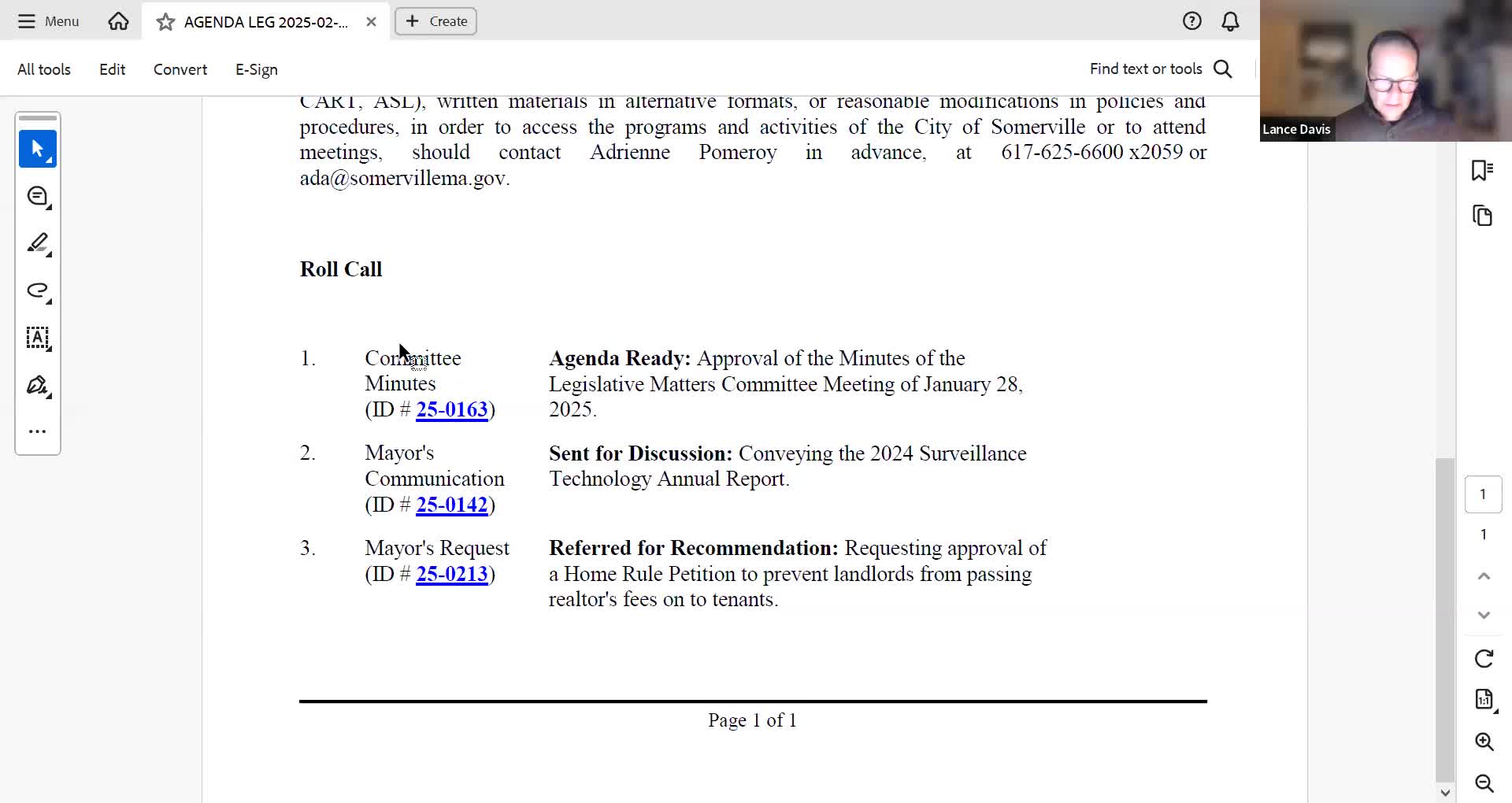Committee reviews Somerville surveillance-technology annual report, asks administration for clarifications and updates
Get AI-powered insights, summaries, and transcripts
Subscribe
Summary
The Committee on Legislative Matters reviewed the mayor's 02/2024 surveillance-technology annual report, requested corrections and additional data (including confirmed ShotSpotter alerts and legal bases for data sharing), and left the item in committee pending amended filings and updated impact reports.
The Committee on Legislative Matters of the Somerville City Council met via remote participation to review the mayor's 02/2024 surveillance-technology annual report and requested several corrections and clarifications from administration and the Somerville Police Department.
The report, prepared under the city's surveillance-technology ordinance and the council's general-use policy, was presented for the committee's review. Chair Lance Davis said the ordinance has been “a real success story in terms of collaboration between the council and the administration,” and thanked staff for the report.
Members asked for numeric and procedural clarifications. Councilor Scott questioned inconsistent ShotSpotter counts in different parts of the report and asked how many activations were later confirmed as gunfire. Captain Sheehan of the Somerville Police Department said the discrepancy resulted from switching reporting periods (fiscal-year to calendar-year) and that the data in one section covered an 18-month span; Sheehan committed to provide the number of confirmed ShotSpotter alerts the following day. "During fiscal year 'twenty 4 … there were 14," Sheehan said when explaining the counts in the revised time windows.
Committee members also asked for clearer legal justification when the department shares surveillance data with outside agencies. Chair Davis and members requested that answers referencing disclosures include the legal standard relied on (for example, the Massachusetts rules of evidence where applicable). Captain Sheehan agreed to add clarifying language where appropriate and to update responses that currently omit the disclosure standard.
Councilors discussed GrayKey device‑unlocking technology documented in the report. Captain Sheehan told the committee GrayKey was used in 33 criminal investigations on 38 devices and that each use was supported by a search warrant. Sheehan described the physical and access controls for the GrayKey equipment: it is stored in a card-key access room with logins limited to three department personnel (the captain in charge of the Criminal Investigation Division, a trained sergeant supervisor, and a trained detective). "The physical device…is contained in a dedicated card-key access only room," Sheehan said.
Members also pressed for more detail on other items: the fire department's marine thermal-imaging camera, bait GPS devices for package and bicycle thefts, and pole cameras that were repurposed from older Homeland Security cameras using UASI grant funding. Captain Sheehan explained that two upgraded cameras were retained for use as rapidly deployable pole cameras and that the administration would amend the relevant impact reports to reflect those changes.
Committee members asked the clerk's office and administration to improve public accessibility to impact reports and annual reports; Clerk Wells indicated the new website (Encode Plus) should make those materials easier to find, with a potential April–May rollout.
Outcome: The committee did not vote to approve or reject the report at the meeting. Instead, members asked the administration to amend the annual report and several impact reports to (1) correct the reporting-period language and counts, (2) add counts of confirmed ShotSpotter alerts, (3) include the legal authority or standard relied on for each instance of data disclosure, and (4) update descriptions of pole-camera conversions and UASI-funded upgrades. The item was left in committee pending those updates and the filing of corrected documents.
The committee signaled it will accept the amended filings when provided and requested that responses and impact-report changes be posted to the council's public records so residents can review the specific explanations and security practices.
